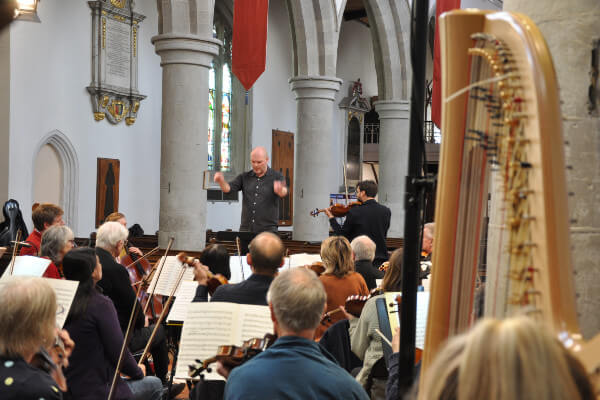Spanish Light for Bridgewater Sinfonia Concert

As autumn looms over the horizon, the Bridgewater Sinfonia brought us a concert of Spanish light and colour together with a touch of Oriental heat.
The concert started with a work by Jules Massenet, a French opera composer. His opera ‘Le Cid’ (as in the film, but in French) has faded from opera houses, but the ballet suite he prepared from the opera score has lived on. The work consists of 7 movements principally based on traditional Spanish dances from different regions. The work is wonderfully rhythmic; no foot was left untapped! The suite also showcased the different sections of the orchestra so that the audience could enjoy all the greatly contrasting sounds of strings, woodwind, brass and percussion. Special congratulations to the percussionists, who were fundamental for the success of the whole concert.
The second work on the programme will remain in the audience’s collective memory for a very long time. It was the Carmen Fantasy by Pablo de Sarasate. Carmen is probably the world’s best known opera, and is again a very Spanish work composed by a Frenchman, in this case Bizet. Sarasate was possibly the greatest violin virtuoso of his period, and he took the best loved themes from the opera and arranged them for solo violin. The work cunningly steps up the level of technique required as it progresses until at the end, the audience was left baffled that it could even be played. The violinist was a young man from Moldova, Dan-Iulian Druțac, still only in his mid-twenties. He played the whole work from memory. It is difficult to capture in words the effect of his performance on the audience. Obviously, all the themes were well known to the audience. But they could only wonder that a human being could play so many notes at such a speed! He also managed to get the entire range of sounds that a violin can generate, from the raucous tone created by double-stopping the lowest strings, to the sweet sounds that are the highest notes than can emerge from a violin. Suffice it to say that at the end of the work, the audience called him back three times for applause, and in the end he had to play an encore before he was allowed to leave. This was a contrast, a haunting work derived from folk themes.
After the interval, the final work was Rimsky-Korsakov’s Scheherazade. This is based on the 1001 Nights (also called The Arabian Nights) and is an extended suite of themes based loosely on the episodes of the work. Above all, it is an opportunity for each section of the orchestra to demonstrate its quality and it also calls upon solos from each section, which were of a remarkable quality. The leader of the orchestra, in this case Philip Aird, had extended violin solos, and they were quite beautifully played.
This was a concert at a level of quality and professionalism that would not normally be expected in a small town like Berkhamsted. The orchestra, its conductor, Steve Joyce-Myall and of course the violin soloist are to be congratulated for giving a performance that will long be remembered.
The story will be continued. On 19 November, the Orchestra will give us a Schubert Overture, Liszt’s Piano Concerto Nº 2 and Dvorak’s 7th Symphony. The Liszt will have as its soloist Victor Maslov, who will be giving his third concert with the Orchestra.
Really great classical music can be heard in St Peter’s Church on the High Street.
For more information visit www.bridgewater-sinfonia.org.uk.
